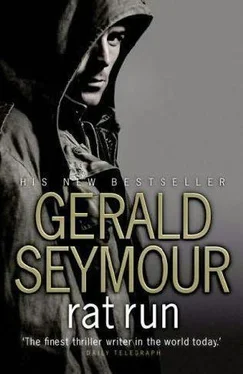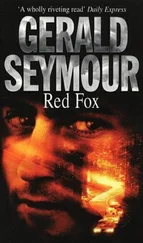Gerald Seymour - Rat Run
Здесь есть возможность читать онлайн «Gerald Seymour - Rat Run» весь текст электронной книги совершенно бесплатно (целиком полную версию без сокращений). В некоторых случаях можно слушать аудио, скачать через торрент в формате fb2 и присутствует краткое содержание. Жанр: Триллер, на английском языке. Описание произведения, (предисловие) а так же отзывы посетителей доступны на портале библиотеки ЛибКат.
- Название:Rat Run
- Автор:
- Жанр:
- Год:неизвестен
- ISBN:нет данных
- Рейтинг книги:4 / 5. Голосов: 1
-
Избранное:Добавить в избранное
- Отзывы:
-
Ваша оценка:
- 80
- 1
- 2
- 3
- 4
- 5
Rat Run: краткое содержание, описание и аннотация
Предлагаем к чтению аннотацию, описание, краткое содержание или предисловие (зависит от того, что написал сам автор книги «Rat Run»). Если вы не нашли необходимую информацию о книге — напишите в комментариях, мы постараемся отыскать её.
Rat Run — читать онлайн бесплатно полную книгу (весь текст) целиком
Ниже представлен текст книги, разбитый по страницам. Система сохранения места последней прочитанной страницы, позволяет с удобством читать онлайн бесплатно книгу «Rat Run», без необходимости каждый раз заново искать на чём Вы остановились. Поставьте закладку, и сможете в любой момент перейти на страницу, на которой закончили чтение.
Интервал:
Закладка:
As the hours passed, Malachy sensed his life had changed again, but he did not know whose hand controlled him. Maybe he should pack his clothes into a black bin-bag, go out through the door, close it behind him and walk away. Go down the stairs from level three, turn his back on block nine and head off into the night… But he sat on the carpet where he could see the telephone. The demons came again, and what had been said to him and of him, the squirming sense of shame. There was no one he could have turned to.
Ricky felt the excitement, always the same when he took delivery.
He wore plastic gloves. He counted out the packages, in the light thrown by a battery lamp, and the contents of each weighed one kilo. With a knife he had slit one open, had seen the dark powder and sniffed it.
He would not open any of the other twenty-four tightly bound packets of brown – no need to, not where they had come from. The last divisions of the load coming to him had been made in Germany and he would have trusted that source with his life. Ricky was in a derelict factory on the north side of the Peckham Road. Once, it had produced cheap leather coats but that market had now gone to Turkey, and he rented the premises. He had realized long ago that it was a waste of his money and dangerous to own the property where the twenty-five-kilo or fifty-kilo parcels were split. Around him, but with cut-offs for security, was a loose network of experts and facilitators. He wanted a driver for a shipment: he hired one. He wanted enforcers, such as the Merks: he went outside for them. He wanted premises: he rented them. He wanted information: he bought it.
He wanted a chemist: he went into the market-place
… It was his way of operating, and he believed it to be the safest.
Security was everything with Ricky Capel.
Little details missed sent men down for the big bird stretches. The men in the A Category gaol wings had all missed little details, and would do fifteen years for the mistake. He despised them.
Each packet was checked, after the one that had been opened, to be certain that the sealing had survived the immersion in the North Sea – but he wore gloves and out in the yard, between the building and the high wall, a brazier was already lit. He wore gloves so that fingerprints would not be on the oilskin wrappings or the taping, but his sweat would line the interior of the gloves, and DNA traces could be taken from a plastic glove. The gloves would be burned, and where he and Charlie had walked on the factory floor would be hosed down as they left so that their foot-prints were washed away.
The checking in the factory was the only time that Ricky Capel would be hands-on with the packages.
Charlie had driven the parcel up from the east coast – still with the smell of the sea on it and the stink of fish.
Davey and Benji would move the single-kilo parcels on to the drop-offs: more labyrinthine arrangements and more gloves for burning. Of course there were risks – everything about life was risks – but they were kept minimal. His success in achieving this was why Ricky was not in Category A, why he created fear, why he was worth – so Charlie told him – more than eighty-five million pounds. Yeah, yeah, not bad for a young 'un still short of his thirty-fifth birthday.
And the factory was always swept for bugs, camera and audio the day before a package was brought for splitting.
Ricky dragged off his gloves. Charlie had the parcels: he was splashing them with water from the hose, washing away the smell of fish and the sea, then walking them to the doorway. Outside, Davey and Benji were in the wheels, a jobbing builder's van and a pick-up with a sign on it for garden clearance. He never moved the stuff in a Mercedes, or in a Beemer, not in anything that would be noticed.
The van and the pick-up drove away. He dropped his gloves into the fire, then heard the hose water on the floor behind him. He knew all the stories, because Benji told him, of the mistakes men had made and the details that had been missed. The latest in Benji's list: the guy who did cocaine, and was bringing in 160 kilos when he was lifted. He ran racehorses and had called one of the nags by the name of the top 'tec who'd done the Krays, which was just pathetic and shouted from the roofs for attention. He'd got fourteen years. Another guy stole a dog, a bull mastiff, off a kid, kept it as his own and let it ride in his car, then killed a punter he was in dispute with, put the body in the car to dump it and there were dog hairs on the body that were matched to the dog he'd nicked, and it was life with at least twenty-one years. His granddad didn't do details and had been third rate. His dad had missed the obvious and was fourth rate. Not the boy, not Ricky Capel.
Charlie's gloves went into the fire.
'You OK, Ricky?'
'Never been better.'
He watched the gloves disintegrate. Later that night, fifteen suppliers would have the twenty-five packets – and would have paid for them. Where they went after that, cut down, divided and sliced up across south-east London, was not his concern. The trade on estates, in back-street pubs and from unlit corners was beneath Ricky Capel's interest.
'I'm feeling good.'
The room was a mess of shadows. When it rang, the telephone was faintly lit by the street-lights below the window, filtering inside. At first, Malachy started to crawl forward to pick it up, but before he had reached it, the bell had gone three times and then the silence startled him. He did not know who played with him. His hand dropped and he slumped. He could have reached out and lifted the receiver, then let it hang from its cable and drop to the carpet; had he done so, the telephone's bell could not have pealed again. Instead, he cringed, left it in its cradle. The bell screamed for him, seemed to shatter the room's quiet.
Half an hour later, Malachy closed the outer door behind him and padded down the walkway. It was near to midnight. Over the railing, he could see the little clusters of figures, where they would have been when Mildred Johnson came back from the bingo. On the last flight of the stairs he had to scrape himself against the graffiti to get past two vagrants hunched down: one had the sleeve of his coat rolled up and a syringe poised above the skin; the other was probing with his fingers for a vein in the back of his leg, contorting himself and cursing at the effort. He could smell them. They seemed not to notice him. He thought the first would use the syringe and then, if the other had found a vein, it would be used again. When he was past them he stumbled down the last flights of the steps, then leaned against the street wall and panted. To go on or turn back? If he turned back he would have to retrace the route past the vagrants with the needle.
It had been the intention of the architect responsible for the Amersham's design that residents should park their cars and vans under the blocks, but for the last fifteen years, no man or woman had dared to leave a vehicle in the garage spaces: smashed windows, stolen radios and tyres, vandalized paintwork had cleared the cavern areas. Interior lights, set in the support pillars, were broken and only the street-lights reached under the low concrete ceilings. The residents who had cars left them out on the street now, under the high lights: they could come out from their barricaded front doors, peer down from the walkways above and check them.
Between distant pillars, a small fire guttered.
Shadows flitted round it and he heard low voices.
Above him was a sign, paint flaking, detailing the numbers of the parking bays. He looked for the number he had been given, then breathed hard and stepped into the interior. He had on the rubber-soled trainers from the charity shop, but however lightly he attempted to walk, his tread seemed to shout his advance. Sometimes his feet crunched on broken glass, and once he stepped and slid in fresh faeces. He could just see some of the numbers on the pillars, enough to guide him towards the far wall. The outline of a car loomed in front of him. He felt the weakness in his gut and at his knees, then the hiss of a window being electrically lowered. He tried to see inside and could make out a head in a balaclava.
Читать дальшеИнтервал:
Закладка:
Похожие книги на «Rat Run»
Представляем Вашему вниманию похожие книги на «Rat Run» списком для выбора. Мы отобрали схожую по названию и смыслу литературу в надежде предоставить читателям больше вариантов отыскать новые, интересные, ещё непрочитанные произведения.
Обсуждение, отзывы о книге «Rat Run» и просто собственные мнения читателей. Оставьте ваши комментарии, напишите, что Вы думаете о произведении, его смысле или главных героях. Укажите что конкретно понравилось, а что нет, и почему Вы так считаете.












